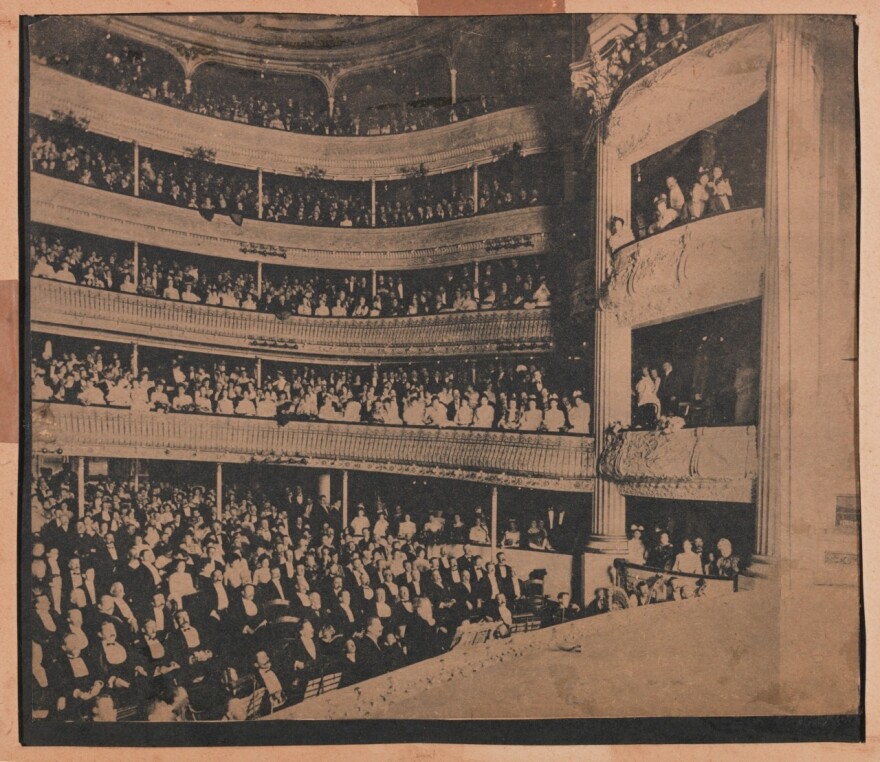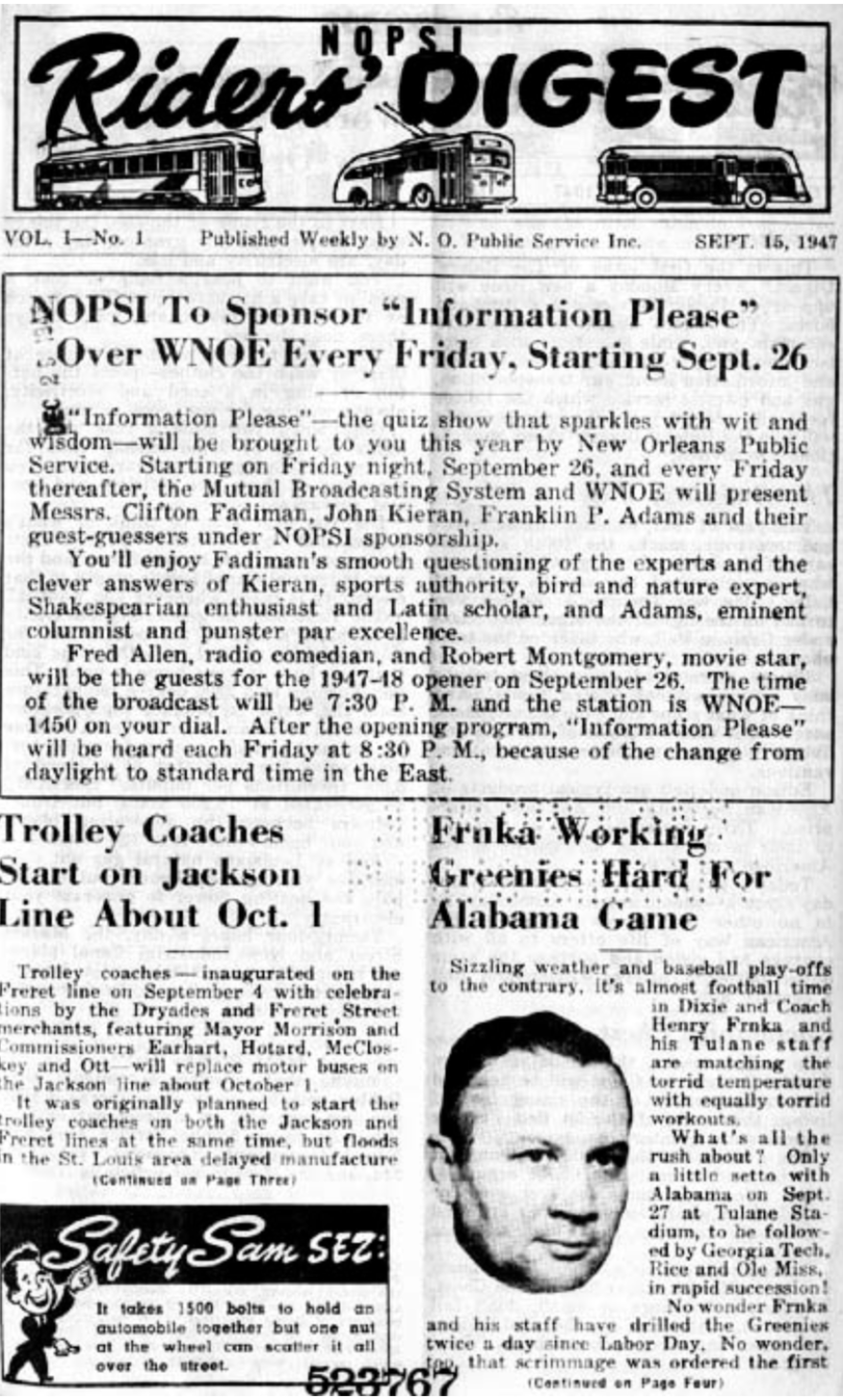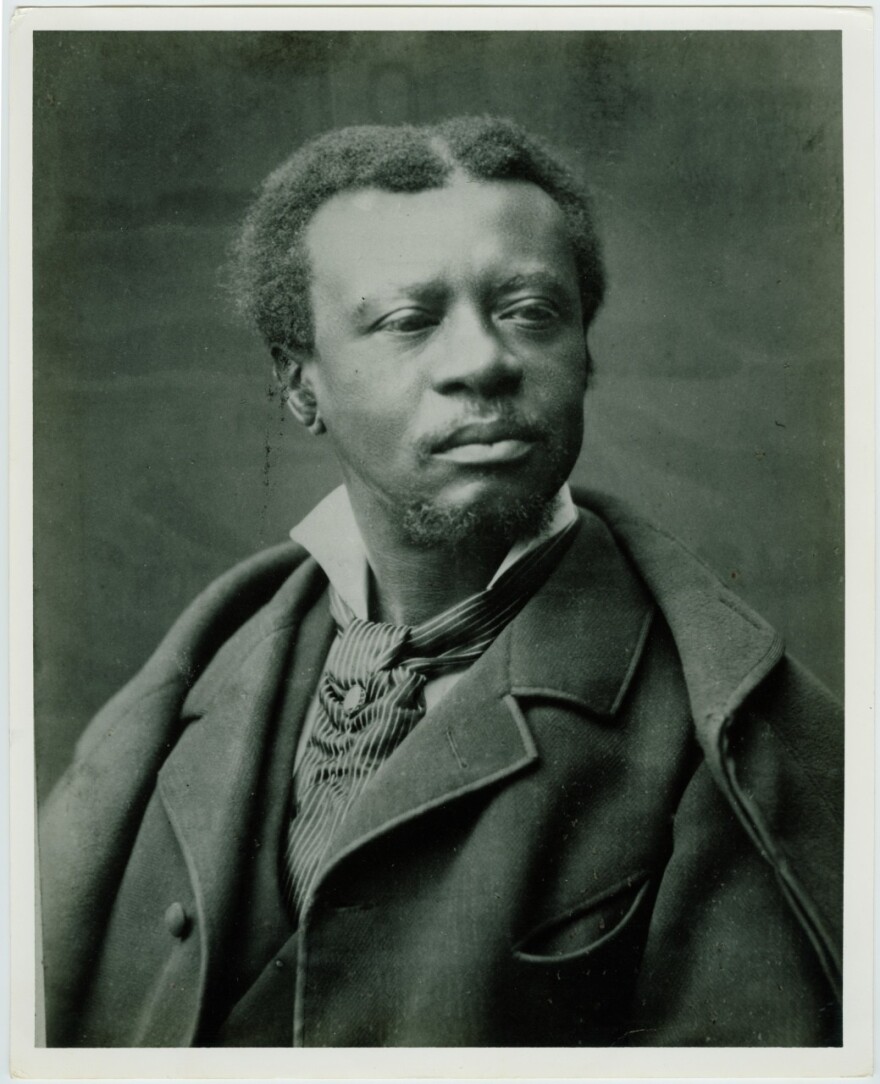I crashed an opera rehearsal the other day. A large group of vocalists, young, old, black, white, Hispanic, Asian, all the genders, belted out in long rows surrounding a piano. They were preparing for the 75th anniversary celebration of the New Orleans Opera Association. I was there to talk to a mother-daughter opera combo: Givonna Joseph and Aria Mason.

“When she was little people would always say ‘Are you going to sing like your mom?’” Givonna told me. “It would drive her crazy. ‘Im so tired, no, I’m not gonna sing… And I said, ‘you’re going to be who you’re supposed to be. I’m not going to tell you what you are going to do.’ And at some point the bug bit her and by the time she got to college, all of a sudden she says ‘I’m going to major in voice.’ What?!”
She did name her daughter Aria.
“I did,” she confirms. “I took a chance. She could have been tone deaf. That wouldn’t have worked out so well.”
Givonna’s been performing since she was a child. She was often the only black girl in her musical theater classes.
“I would try to get my friends to come with me to do that and they said ‘well, we don’t do that. Why are you doing that?”
In high school, she got into opera.
“You know, guys would be like, ‘You do what?’ So dating criteria was ‘Will you come to my concerts? If you cannot handle that, no, goodbye.’”
Her daughter Aria, also an opera singer, is just as familiar with how shocked people are when they find out what she does. But this doesn’t surprise her. She studied classical music, and says black people were largely missing from the curriculum. And when they were there, “it was mostly for their ‘exotic compositions’, or things that evoked Afro-American life or Caribbean life or what have you,” Aria says. “Nothing that really gave the full body of understanding of the way that they decided to write or the pictures that they chose to paint throughout their career as you would a Mozart, a Schubert, a Liszt, a Strauss, or someone like that.”

That’s why these two founded Opera Creole, a company dedicated to performing works by composers of African descent. Especially those from 19th Century New Orleans. And the reason they’re able to do this, is that Opera was huge in New Orleans back then. And there were a lot of black composers.
Let’s look at the general Opera scene in the early 19th Century first. Opera’s pretty bougie today, but back then, it was pop music - people sang it while they did their laundry, while they cooked, while they walked down the street. And even though bigger cities up north have more of a reputation for Opera, New Orleans was doing it bigger and better, first. A lot of people just don’t know that. But Jack Belsom does. He’s been attending the opera in New Orleans since 1945. “I can think of only one exception that I haven’t heard every opera performance that they’ve done here, both nights” Jack proudly tells me.
There is no one else like Jack. He’s a fanatic, and knows pretty much everything there is to know about opera in New Orleans. Including why it was so big here. “For a lot of the population beginning in the early part of the 19th century, they had perhaps moved here from France, and this was their background, from where they came from.”
And not just people from France, but from the French colonies: particularly the colony of St. Domingue, what today is the independent country called Haiti. John Baron is the author of Concert Life in Nineteenth Century New Orleans: A Comprehensive Reference. He says St. Domingue had opera since the 1750s. “If they didn't teach their slaves how to read or write, they taught them how to play the violin,” he adds.
Then, at the end of the 18th century, the Haitian revolution sent thousands of refugees to New Orleans. John continues. “And so there were very talented musicians who suddenly came here - black, white, free, slave - all kinds of people with all kinds of backgrounds - but a passion for opera. And they missed it! When they came here in the early 1790s. This was the entertainment they were used to in France, this was the entertainment they were used to in Haiti. This is what they wanted to have here in New Orleans. So it didn't take them long to start opera.”
The first opera was performed in New Orleans in 1796. Ernest Grétry's ‘Sylvain’. After that, it just snowballed.

By the mid 1800s, there were well over 200 productions a year. Jack Belsom gives a rundown of the 1855 season at the Orleans Theater. “The season began on the 25th of November 1855, and it ran on a weekly basis then until the thirty first of May 1856 with approximately five performances per week usually Sunday Monday Tuesday Thursday and Saturday.”
And that’s just one theater - there were at least four opera houses operating simultaneously at the same time around then - and choose your language - French, English, German, Spanish, Italian. Countless Operas in Europe had their U.S. premiere in New Orleans. Sometimes an opera would open in Paris and New Orleans, on the same night. And everyone was there.
The opera houses were open to all people in the city. But they were segregated, John Baron says. “There were sections in the opera houses marked off for slaves or servants, others for free people of color.”
The most expensive seats were a dollar, and it went down to a quarter. One area that wasn’t segregated was the pit - the orchestra pit. There were so many classically trained black musicians that played in these pits. So many, that they eventually decided to form their own group. In 1840, an independent orchestra formed of mostly free men of color, 100 men. This was the Philharmonic Society, the first independent orchestra in New Orleans. It was conducted by a black violinist named Constantin Debergue. They performed mostly in their own theater which was on Elysian Fields, and Dauphine, called the Renaissance theater (where United Hardware is today).


Even though creole musicians were employed by opera houses across the city, they still chose to found their own orchestra, in their own theater. There’s not much else out there about the philharmonic society other than what I just told you, but there is a lot of interest. One thing we do know, is that many of the creole composers that were named in the beginning of this story, were members. One of them was a guy named Edmond Dédé.
“Well let me first say that he was my first love!” Givonna Joseph jokes, figuratively. His “Mon Pauvre Coeur” was the first published work by a free man of color in New Orleans. It’s just a beautiful piece.
Dédé didn’t just play music. He wrote it. A lot of it. And a lot of different kinds. About six operas, five operettas, one opera comique, as well as symphonies and choral works. The thing is, to this day, none of his operas have ever been performed.
Edmond Dédé was born a free person of color in 1829. His parents, also free, came to New Orleans in 1809,

after the Haitian revolution. His dad was a musician, and played with a local military band. This turned Edmond on to the clarinet, but he soon switched to the violin, and never let go. He studied with well-known Italian composer Ludovico Gabici, one of a few white musicians in the city who taught people of color. He played in pit orchestras for operas and symphonies, eventually joined the philharmonic orchestra, and started writing his own music. The thing is, no one would play it.
Sultana Isham is a violinist and composer in New Orleans, and is studying Dédé. “He had a really hard time when he was here” she says. “Because of the discrimination that he was constantly going through, specifically as a dark skinned black man.”
In the 19th Century, white composers published sheet music with their faces on the front cover. But Creole composers didn’t, for fear their music wouldn’t sell. And pictures of Dédé show he was particularly dark skinned. “But he was extremely talented,” Sultana adds, “and didn't allow that to stop him from getting what he needed to get, and do what he wanted to do.”
Dédé realized his musical career could only go so far in the South, and so he needed to get out. He moved to Mexico when he was nineteen, and worked in a cigar factory to make money. He worked, and saved for three years. When he returned to New Orleans in 1851, the Civil War was looming, and race relations felt more threatening than before. The cards were against him here.
Dédé continued playing music and working as a cigar maker in New Orleans for six more years, until he finally had enough money to leave for good. He went to France, bounced around conservatories there, and a few years later became the conductor of the Grand Théâtre of Bordeaux. Clearly things moved a lot faster for him across the pond.
“He was successful, very successful,” says Harold Dede, who’s grandfather’s uncle was Edmond Dédé. Harold didn’t know about his famous relative until 1961. Neither did his cousin, Wesley Dede. “I was driving the streetcar, and he was in the rider’s digest!”
The streetcar used to have a free weekly brochure, the rider’s digest, which advertised community events, streetcar service news, and had a recurring history column called "Did You Know?" So Wesley’s riding the streetcar one day, “and I picked it up start reading and then when I seen the last name Dede, then I say, Well I got to find out a little more.”
Wesley said it felt like a big holiday. “I never heard anything about it till I seen it. So I went home and I asked about it, and my grandfather told me who he was. I didn't think I had a relative with that kind of status. When I found out, you know, that I had an uncle that was the first black man to play in the Metropolitan Opera House. I brought it to school with me every day.”

Wesley took that Rider’s Digest to high school with him every day in 1961. And he searched for his great-great

uncle’s music. But it wasn’t until he and Harold were adults, when they finally heard it. I had a doctor, believe it or not, he told me about the Hot Springs Festival, that showcased Edmond Dede’s music” Harold said.
In 2000, Arkansas’s Hot Springs Music Festival Symphony Orchestra performed Dede’s music for a live album. This is one of the only known recordings of his music.
Back to Dédé, who finally made a go of his career in France. He conducted the orchestra in Bordeaux for 27 years. He married and had children who also went on to play music. Then, one month after the Civil War ended, on May 10th, 1865, Dede work finally premiered in New Orleans. His Quasimodo Symphony was performed by an African-American orchestra before a packed house. Dede didn’t show up to this premier. It took a few more decades until he finally did come home, to New Orleans, to give a concert of his own. And he barely made it. His boat shipwrecked, and he landed in Corpus Christi.
Imagine - you haven’t returned to your hometown for thirty five years, because that hometown wouldn’t let you make a living being a composer, because you have dark skin. You finally decide to make the voyage home, and your ship sinks. You manage to survive the wreck, though you do lose your precious violin, which you were planning on performing with. And after all that, you finally get to New Orleans, and you’re road blocked once again.
“He could not perform in the French opera house, or major venues here,” says John Baron. “And he was forced to perform in black churches, where the acoustics were horrible.”
It’s 1893. Slavery’s over, and reconstruction is, too. White ex confederates are regaining control of the city. “The relations between blacks and whites in many cases were worse.”
Critics of the time said it was a shame couldn't play in the concert halls. But whites flocked to his concerts in the churches anyway, “because they knew of his reputation as a great violinist. They wanted to hear him.”
It didn’t matter. Dede was insulted, traumatized. He went home to France, and never returned.
Violinist Sultana Isham still has trouble getting her hands on Dédé's music. “I mean I can play what I know

from ear, just like what I've heard but it's not the same as reading from a score.”
Which is why Sultana needs to do her own transcriptions of Dédé's music if she wants to play it. She plays Dédé's ‘’Reverie Champetre’’ from a piece of printer paper with notes plotted out on four staff lines she drew herself.
That’s how inaccessible Dede’s sheet music is. But this only motivates Sultana to continue studying Dédé. “I am trying to replace what is default for me. Especially with this genre. Classical music is my first language of music.”
And yet that still surprises people.
“I've had experiences where people have told me ‘I have never seen a black person play the violin before!’ with such confidence and such ease with saying it.”

Sultana relates to Dédé in a lot of ways. She says people have always reminded her of her race in the classical world. As if there’s some disconnect between her skin color, and her playing classical music. One story specifically stands out, during her freshman year studying music at Syracuse University.
“I had an ear training exam and I stayed up all night before, I didn't really get any sleep, studying really, really hard because this was the hardest class for everyone. The professor passed out the exams, and the exams were on white sheets of paper. But he gave me a manila colored test. And they said that they were giving me the Manila color test because I was black. In front of everyone. And then they go on to say how we test lower than everyone else.”
The teacher printed her test on a different color.
“A manila colored test. You went out of your way. That's what I mean. Like they reminded me who I was.”
Race overshadowed ability. Just like Dédé. He could write an amazing opera, but no one in New Orleans would stage it. He could play violin as good as anyone, but he couldn’t play it in a concert hall, where violin is played. And over a century later, Sultana felt pushed out of that world. There’s a fear that her music will somehow get snuffed out. “I don’t want that to happen to me. I don’t want my work that I’ve spent a lot of time on to just fade away. And I've become aware of the many different ways that they do that.”
So Sultana works to preserve Dédé’s legacy, to honor him, and forge a path for her own work to be recognized and celebrated. And Givonna Joseph and Aria Mason of Opera Creole are doing the same thing. They founded a company dedicated to performing works of black classical composers, so that people know that there were black composers, and can enjoy their music. Here’s Aria.
“You know, the narrative of white supremacy only succeeds if you continue to produce proof of the inferiority of certain groups of people. And classical music is seen as the pinnacle of sophistication, technical proficiency, brilliance, virtuosic brain output of music. And if your narrative is ‘this was created by European descent people for European descent people, people of African descent did not participate in writing this,’ and when you come back and actually say all of that narrative is in fact incorrect, you’re not only restoring a voice to the women and men who wrote the music and performed the music, you’re also telling other people the narrative of white supremacy is a false narrative.”
Aria and Givonna are currently transcribing Dédé’s opera Morgiane ou Le Sultan d'Ispahan, from French to English, and plan to give it it’s world premiere in 2019. At last, Dede’s opera will be staged in New Orleans. And they’re not stopping there. Givonna wants to write an opera.
I ask her if she’s written any operas before. “Well, no. But…” she replies, as her daughter Aria shakes her head and says “Daughter is shaking her head, but daughter who also know that this is a woman who will do whatever she needs to achieve her vision.”
That’s right, Givonna says.
*Richard Rosenberg did the Morgiane ou Le Sultan d'Ispahan recording, as well as the recordings for the music featured on the Hot Springs Orchestra album. Rosenberg also performed all the orchestrations in the Hot Springs recordings.
TriPod is a production of WWNO in collaboration with the Historic New Orleans Collection and the Midlo Center for New Orleans Studies at UNO.



